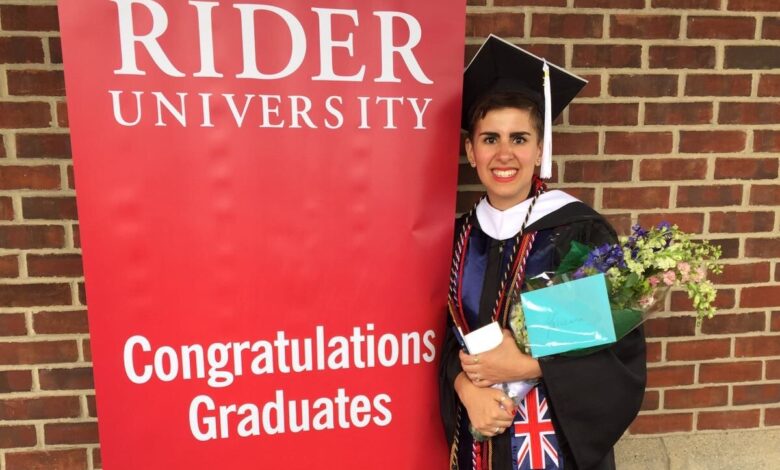
Elimination of American Studies program causes disappointment
By Kaitlyn McCormick
Following the announcement of 17 programs up for elimination from the university’s latest prioritization, many in the Rider community have expressed frustration. Mickey Hess, director of the American Studies program (AMS) for its last three years, however, is confused and citing a major drawback to the prioritization process: What happens when programs with low major declarations still have high class enrollment?
AMS brought popular courses to Rider students, such as hip-hop and American culture and Martin Luther King Jr’s America. Now, with the program under the knife, Hess fears that “in many cases, an AMS course would be a student’s only option in certain categories in the gen[eral] ed[ucation] to take a course that was devoted to a Black thinker.”
Information provided by Director of Communications Rachel Stengel showed that the number of students declaring first, second and third majors in AMS were declining from 2018 to 2022. While the program saw seven students enrolled in the B.A. program in 2018, only two students were pursuing the major in 2022.
Program reports and recommendations came from the Academic Prioritization Task Force, and, according to Stengel, “The final decision [to eliminate the program] rested with the president and the provost.”
According to the program evaluation obtained by The Rider News, AMS scored favorably in criterions like “Size, Scope, and Productivity of the Program,” “Revenue and Other Resources Generated for the Program” and “Costs and Other Expenses Associated with the Program.”
The task force ranked AMS least favorably in three criterion: “External Demand for the Program,” “Internal Demand for the Program” and “Quality of Program Inputs and Processes.”
Despite the task force’s judgment of low internal demand, AMS courses had strong credit enrollment hours in various courses. Capping at 25 students per section, Hess reported that AMS 212: Multicultural America enrolled 24 students this spring semester, AMS 308: Kurt Vonnegut’s America enrolled 24 students in spring 2022 and AMS 227: Martin Luther King Jr’s America reached full enrollment in fall 2020.
Hess also maintained that AMS courses served various other disciplines across the university to fulfill general education requirements in the College of Arts and Sciences and Continuing Education Program.
Diversifying course offerings
While the AMS program has been slated for elimination, Provost DonnaJean Fredeen maintained that there are ways to potentially keep the popular courses in circulation, encouraging Hess to bring them to the Multicultural Studies Committee, an interdisciplinary minor program, to potentially have the courses renumbered under different departments.
Fredeen explained that one of the main focuses of the prioritization process and the recommendations by the task force was to “maximize” seats and courses offered to students.
“What ends up happening is if you have too many courses offered in a semester, they end up competing against each other, and as a consequence you end up with lower enrollments,” Fredeen explained.
While there’s been criticism by some involved in the program for eliminating a major that seems to align with the university’s commitment to diversity, equity and inclusion (DEI), Fredeen said that Rider’s focus has manifested in inserting intentional diversity into courses across the disciplines, rather than any one specific course requirement.
“We actually should be looking at all of our courses and asking ourselves … where we could be embedding DEI content across the entire curriculum instead of it just being a course that you take and you kind of check off a box,” Fredeen said.
‘I think it’s a shame’
The disappointment in the task force’s recommendation to eliminate the program reaches far beyond those currently at the university. Marianna Watson ‘17 was dismayed to hear that the program she had minored in at Rider had made it onto the academic chopping block.
“I’ll be honest, the [AMS] program was not my major, and I arguably spent less time in it, but those were like the only classes that I remember still,” said Watson, who had majored in English.
The alumna recalled her favorite class being Hess’s Hip-Hop and American Culture class. Looking back at her college career, Watson said that the class, which she described as “impactful and cool” was “probably the class that sticks out the most.”
Now working in higher education, specifically the Office of Equity, Diversity and Inclusion at Tacoma Community College in Washington state, Watson has been able to draw connections from her minor studies over six years ago to her present occupation.
“It’s not that I don’t remember stuff from my English degree, but it’s just in my own personal life and in my own line of work I have found [AMS] to be more relevant,” Watson said.
Additionally, Watson expressed grievance not only that the university would be eliminating a program that had impacted her educational and professional life, but because less students would get to experience those same opportunities.
“I always feel like arts and humanities tends to get devalued first, and, unfortunately, when you take away those cultural and kind of global studies, you aren’t giving students the opportunity to be as learned about the world as they could be, and I think it’s a shame,” Watson said.


